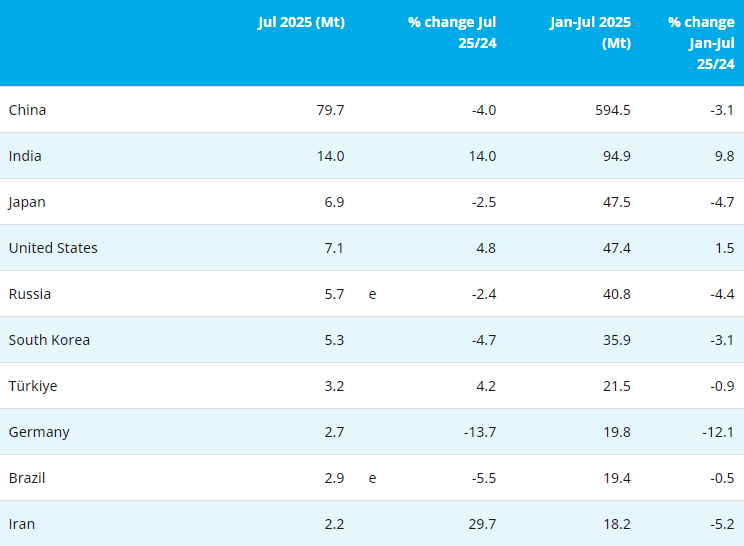Reuters reported that copper hit two month lows as investors shied away from risk with the US presidential election, China's leadership transition and two central bank meetings this week stoking uncertainty over global economic growth.
Most analysts said that victory in Tuesday's US election for Republican contender Mitt Romney would pave the way for more deregulation and tax cuts while a second term for President Barack Obama would likely bring bigger public investment in education, research and infrastructure.
China's once a decade leadership transition event, the 18th Communist Party Congress, is scheduled to start on Thursday along with policy meetings held by the European Central Bank and the Bank of England.
Mr Zhou Jie analyst of CIFCO Futures said that "The markets did not pick up despite Friday's positive US nonfarm payrolls data which underlined how cautious everyone is before the US elections and China's Party Congress referring to signs US.
The Commodity Futures Trading Commission's Commitments of Traders showed that also underscoring the risk averse mood were US hedge funds and money managers, who had cut their net long positions in copper in the week to October 30th 2012.
Three month copper on the London Metal Exchange had edged down 0.3% to USD 7,643.25 per tonne by 0706 GMT its lowest since Sept. 5. The most active February copper contract on the Shanghai Futures Exchange lost 1.5% to close the session at CNY 55,780 catching up with steeper falls in London on Friday and marking its cheapest level since September 7.
Mr Zhou said that "Base metals prices are being weighed down by China's weak downstream metals demand and are also unlikely to get a lift from positive policy announcements this week given the two political transition events on the schedule.”
Meanwhile, China's central bank's announcement in its latest policy report that it would prioritize supporting the economy above other needs only served to affirm expectations that the recovery in the Chinese growth engine is feeble at best.
And in China's physical copper markets, spot prices are still trading at a discount to the ShFE front-month contract, indicating weak consumer demand. Also denting sentiment were copper stocks in ShFE-monitored warehouses, which were at 6 month high at 197,937 tonnes on Friday after rising 31% since September 7. CU-STX-SGH the rise in copper stocks was accompanied by an import loss of between CNY 1,000 to CNY 2,000 which weighed down on copper import volumes and bonded warehouse drawdowns.
We believe this trend may worsen copper's fundamentals in China and will eventually cause more unsold stocks of Chinese smelters to show up in warehouse volumes here.
Analysts said that smelters would probably warehouse their unsold stocks for financing. Given how low copper prices are now it would make sense for smelters to put excess supplies under financing until the markets recover. To do that they'll have to put them in warehouses and get receipts.
Mr Zhou that ShFE aluminium and nickel prices were further pressured by a decision by the Indonesian Supreme Court to scrap a May 6 government ban on the export of unprocessed minerals including nickel ores and bauxite.
The news is negative in nature for prices as it means Chinese smelters can get hold of raw materials more easily which means metal production will likely grow. But impact of this news will be quite small as everyone is distracted by this week's political events.
Most analysts said that victory in Tuesday's US election for Republican contender Mitt Romney would pave the way for more deregulation and tax cuts while a second term for President Barack Obama would likely bring bigger public investment in education, research and infrastructure.
China's once a decade leadership transition event, the 18th Communist Party Congress, is scheduled to start on Thursday along with policy meetings held by the European Central Bank and the Bank of England.
Mr Zhou Jie analyst of CIFCO Futures said that "The markets did not pick up despite Friday's positive US nonfarm payrolls data which underlined how cautious everyone is before the US elections and China's Party Congress referring to signs US.
The Commodity Futures Trading Commission's Commitments of Traders showed that also underscoring the risk averse mood were US hedge funds and money managers, who had cut their net long positions in copper in the week to October 30th 2012.
Three month copper on the London Metal Exchange had edged down 0.3% to USD 7,643.25 per tonne by 0706 GMT its lowest since Sept. 5. The most active February copper contract on the Shanghai Futures Exchange lost 1.5% to close the session at CNY 55,780 catching up with steeper falls in London on Friday and marking its cheapest level since September 7.
Mr Zhou said that "Base metals prices are being weighed down by China's weak downstream metals demand and are also unlikely to get a lift from positive policy announcements this week given the two political transition events on the schedule.”
Meanwhile, China's central bank's announcement in its latest policy report that it would prioritize supporting the economy above other needs only served to affirm expectations that the recovery in the Chinese growth engine is feeble at best.
And in China's physical copper markets, spot prices are still trading at a discount to the ShFE front-month contract, indicating weak consumer demand. Also denting sentiment were copper stocks in ShFE-monitored warehouses, which were at 6 month high at 197,937 tonnes on Friday after rising 31% since September 7. CU-STX-SGH the rise in copper stocks was accompanied by an import loss of between CNY 1,000 to CNY 2,000 which weighed down on copper import volumes and bonded warehouse drawdowns.
We believe this trend may worsen copper's fundamentals in China and will eventually cause more unsold stocks of Chinese smelters to show up in warehouse volumes here.
Analysts said that smelters would probably warehouse their unsold stocks for financing. Given how low copper prices are now it would make sense for smelters to put excess supplies under financing until the markets recover. To do that they'll have to put them in warehouses and get receipts.
Mr Zhou that ShFE aluminium and nickel prices were further pressured by a decision by the Indonesian Supreme Court to scrap a May 6 government ban on the export of unprocessed minerals including nickel ores and bauxite.
The news is negative in nature for prices as it means Chinese smelters can get hold of raw materials more easily which means metal production will likely grow. But impact of this news will be quite small as everyone is distracted by this week's political events.
Copyright © 2013 Ferro-Alloys.Com. All Rights Reserved. Without permission, any unit and individual shall not copy or reprint!
- [Editor:editor]



 Save
Save Print
Print Daily News
Daily News Research
Research Magazine
Magazine Company Database
Company Database Customized Database
Customized Database Conferences
Conferences Advertisement
Advertisement Trade
Trade









 Online inquiry
Online inquiry Contact
Contact

Tell Us What You Think